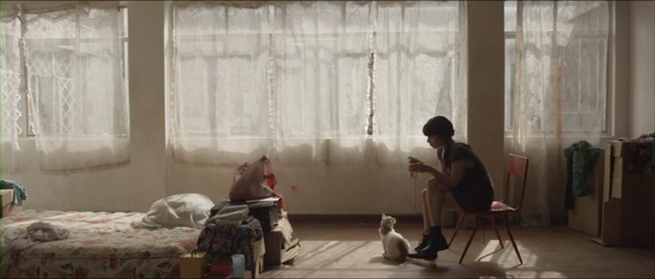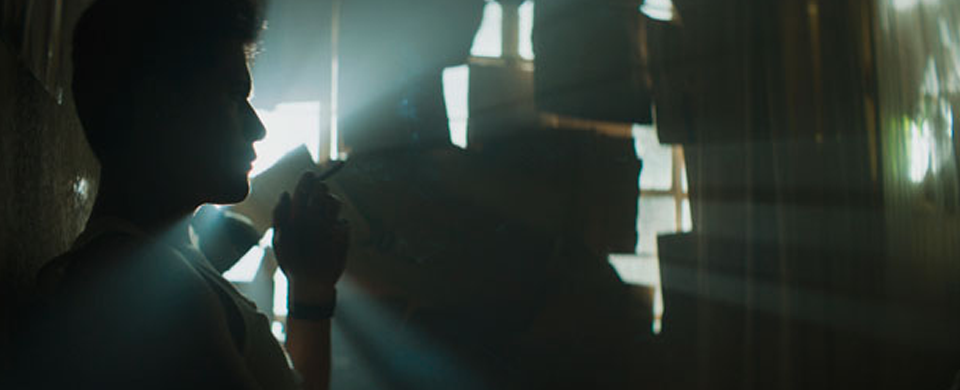Reviews include Irena’s Vow, The Beast, and Before I Change My Mind.
FIPRESCI Diary: Festival des Films du Monde, part two
September 4, 2014
by Jake Howell
On September 1st, the final day of the 38th Festival des Films du Monde in Montreal, the FIPRESCI jury—consisting of members from France, Germany, Slovakia, Turkey, and Canada—awarded two prizes: the first, in the World Competition to Ingo Haeb’s Das Zimmermädchen Lynn (Chambermaid Lynn); the second, in the First Features program to Max Zunino’s Los Bañistas (Open Cage).

With five members on the FIPRESCI jury and two programs to adjudicate, it was decided Day One amongst ourselves that we would divide the act of seeing upwards of forty films into two sub-juries. After talking it over and hearing what others were more inclined to see, I ended up on the First Features jury with Léo Soesanto of Les Inrockuptibles, and throughout the duration of the festival Soesanto and I watched 18 features from debut filmmakers.
The fascinating thing about first features—why I wanted to critique this program in a FIPRESCI capacity—is the beautiful, dangerous understanding that filmmakers only get one first feature. A debut on the scene is inherently unique; what filmmakers choose to present to the world as their initial offering says a lot about their talents, ideas, proclivities, and their nuances. To me, that’s really exciting—and absolutely intimidating. Maybe these directors need refinement; maybe there is raw potential hiding in a different cut of the film. Maybe the debut is an unfortunate, unsalvageable mess. Either way, knowing that these filmmakers have only directed one feature informs how we see their work: if it’s outstanding in any way, the finished product all that more impressive. If the film plainly stinks, the result is chalked up to directorial inexperience. A great first feature can forge a career overnight; a poor one can spell years of critical expectations (most of them negative).
The stakes are high.
Watching these 18 features was more or less a cinematic minefield, but Soesanto and I sifted for hours to eventually uncover a few gems. These films stood out from the dozen or so features that demonstrated poorly executed clichés, featured tame, safe, or underwritten narratives, or simply needed a stronger voice to justify revisiting topics and themes that are stereotypically easy to shoot on a small budget. Many of these films were shot in a maximum of two to three locations; local actors, handheld cameras, natural lighting, that kind of thing. It’s easy to spot the hallmarks of a micro-budget production, which isn’t something I necessarily see as a criticism—that said, the most successful films in this program looked professional and were strong enough to make me feel surprised that it was a debut and not a third or fourth feature.
Our winner, Max Zunino’s Open Cage, is an example of one of these films. From the opening shot it was immediately clear that Zunino had meticulously envisioned his work, with engaging camera angles, inspired blocking and art direction, and excellent frame composition. Open Cage’s story of Mexican poverty and a young girl’s attempt to navigate it isn’t exactly new, but Zunino’s motif of cages and feeling socially (and economically) confined keeps the film both visually interesting and thematically relevant. All told, the film’s acting, writing, and cinematography are so carefully realized that it’s hard to believe this is Zunino’s first feature.

Open Cage has a small role by Mexican actor Harold Torres, who plays the intense and brooding lead in González, another excellent first feature in this category. Like Open Cage, it’s again a depiction of destitution in Mexico, but instead of the slice-of-life approach to overcoming economic hardship, director Christian Diaz Pardo takes his lead character on a descent into frustration, anger, and finally, violence. It’s a cynical look at capitalism and a religious pyramid scheme, steeped in dramatic irony that feels mature and cohesive from start to finish.
From Germany came Florian Gottschick’s Bright Night, a film that feels so Sundance-y I am wondering if the DCP got lost on the snowy ski hills of Park City without ever actually screening there. A single-location four-hander psychological drama (emphasis on the psychological), the film revolves around Anna, a young woman, and her relationship with her boyfriend. At a cottage for a getaway, they spend a weekend with another couple—homosexual—and as the booze starts to flow, some sexual monkey-wrenches are thrown into the mix. Halfway through the film, though, and the gears switch entirely: Anna steps mentally out of herself to watch the evening’s events unfold from a third party’s perspective, and Gottschick’s representation of self-psychoanalysis is both curious and intriguing to watch. Stylistically and creatively, I would be remiss if I didn’t write about Bright Night in some form or another.

The Festival des Films du Monde was an interesting festival. It was an endearing event—small, humble—but if I put the films first, the movies mentioned in this piece simply needed larger audiences behind them. These titles screened in relative obscurity (there were dozens of empty seats at every showing I went to), but the optimistic takeaway here is that these filmmakers are destined for greater things, be they head-turning sophomore entries or larger festivals that can provide the infrastructure and exposure to catapult them into the next phase of their career.



